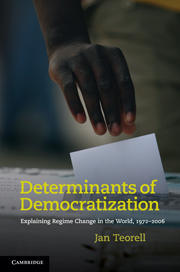Book contents
- Frontmatter
- Contents
- List of tables
- List of figures
- Acknowledgments
- Introduction
- 1 Explaining democratization
- 2 The shadow of the past: social determinants
- 3 The power of prosperity: economic determinants
- 4 The impetus from abroad: international determinants
- 5 The force from below: popular mobilization
- 6 Exogenous shocks and authoritarian regime types: institutional contingency
- 7 Conclusions
- Appendix A Data and variable definitions
- Appendix B Statistical model
- Appendix C Robustness tests
- Appendix D The pathway criterion
- References
- Index
Appendix D - The pathway criterion
Published online by Cambridge University Press: 05 June 2012
- Frontmatter
- Contents
- List of tables
- List of figures
- Acknowledgments
- Introduction
- 1 Explaining democratization
- 2 The shadow of the past: social determinants
- 3 The power of prosperity: economic determinants
- 4 The impetus from abroad: international determinants
- 5 The force from below: popular mobilization
- 6 Exogenous shocks and authoritarian regime types: institutional contingency
- 7 Conclusions
- Appendix A Data and variable definitions
- Appendix B Statistical model
- Appendix C Robustness tests
- Appendix D The pathway criterion
- References
- Index
Summary
Gerring and Seawright define a pathway case as “a case where the causal effect of one factor can be isolated from other confounding factors,” and suggest two criteria for how to single out such a case: (1) that it is “not an extreme outlier,” and (2) “that its score on the outcome . . . is strongly influenced by the theoretical variable of interest . . . taking all other factors into account” (2007, pp. 122, 126). In operational terms, the latter criterion implies a case that is close to the regression surface (has a small residual) when the causal variable under consideration is included in the model, but far from the regression surface (has a large residual) when it is not controlled for.
Although I find Gerring and Seawright’s approach promising, I take issue with their first criterion, and instead add a new one. Gerring and Seawright provide no substantial arguments for why a pathway case should not be an outlier (or at least not an extreme outlier). One could of course argue that there is some general value in studying a case that is well accounted for by the entire causal model. But that is not directly relevant to the issue of whether a specific causal variable works as posited or not. One could thus envision a case where one particular mechanism is strong and present, but where the outcome is still not fully accounted for (that is, a case with a large residual). For this reason, I do not address the issue of outliers in my case selection criterion. There is, instead, another criterion that needs to be added: that the case in question actually experiences the outcome that should be explained. It makes little sense to trace the mechanisms causing democratization, for example, in a case that never democratized. Unfortunately, Gerring and Seawright forget this crucial aspect of how to select a good pathway case.
- Type
- Chapter
- Information
- Determinants of DemocratizationExplaining Regime Change in the World, 1972–2006, pp. 184 - 185Publisher: Cambridge University PressPrint publication year: 2010

